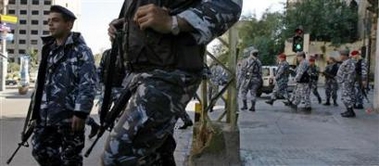 BEIRUT (AFP)–Lebanon entered a decisive week Monday during which parliament is due to elect a new president, with many warning that the country risks sliding into chaos if the political vacuum persists."We are now in an interim period which may lead us to stability, or to chaos and confrontation," Cardinal Nasrallah Sfeir, from whose Maronite community Lebanese presidents are drawn, said during his Sunday sermon.
BEIRUT (AFP)–Lebanon entered a decisive week Monday during which parliament is due to elect a new president, with many warning that the country risks sliding into chaos if the political vacuum persists."We are now in an interim period which may lead us to stability, or to chaos and confrontation," Cardinal Nasrallah Sfeir, from whose Maronite community Lebanese presidents are drawn, said during his Sunday sermon.
President Emile Lahoud left office at the end of his term Friday after parliament failed to elect his successor amid continued deadlock between the government and the opposition.Although politicians have vowed to agree on a consensus candidate by the time lawmakers convene again for a vote on Friday, there has been no tangible progress.
"Everybody – especially those responsible for brokering an agreement – are asked to show seriousness and honest patriotism," the cardinal said.The government, considered illegitimate by the opposition since its six ministers quit last November, said Saturday that it was taking charge of running Lebanon in line with the constitution.
Lebanon is now "without an executive power," Hezbollah number two Naim Qassem said.Prime Minister Fuad Saniora’s government "does not exist, cannot rule and cannot take over from the presidency," he said.The deadlock is widely seen as an extension of the confrontation between the two sides’ foreign sponsors – the U.S. and its key Arab ally Saudi Arabia for the government, and Iran and its key Arab ally Syria for the opposition.
Attention focused on Tuesday’s Middle East peace meeting in the U.S. following Syria’s 11th-hour decision to attend over the opposition of its ally Iran.
The An-Nahar daily said all negotiations between the government and the opposition were effectively frozen until after the meeting in Annapolis outside Washington.
"There won’t be any serious developments before the results of Annapolis are clear, especially as far as how future relations between Syria and Washington will evolve," the newspaper said.
Justice Minister Charles Rizk told Lebanese radio that by agreeing to attend the conference Syria was playing a pivotal role, "which constitutes a first step in U.S. efforts to break the Syrian-Iranian alliance."
Syria said Sunday it was sending Deputy Foreign Minister Faisal Mekdad to Annapolis following what it said were assurances that the return of the Israeli- occupied Golan Heights would be on the meeting’s agenda.
Peace talks between Syria and Israel broke down in 2000 when Israel baulked at Syrian demand for the return of the whole territory right down to the shores of the Sea of Galilee, its main water source.



